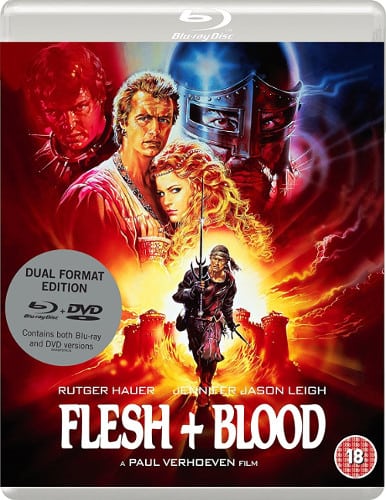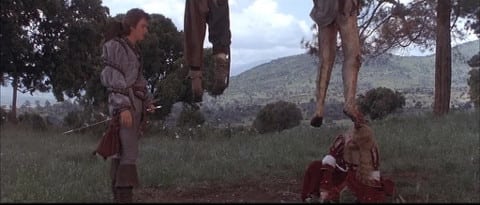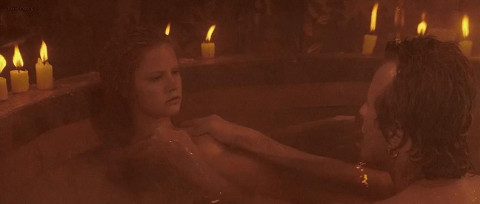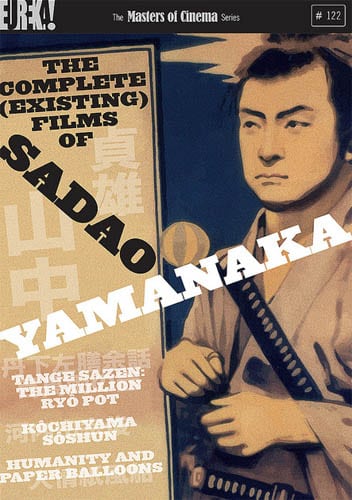Flesh + Blood (1985)
Directed by: Paul Verhoeven
Written by: Gerard Soeteman, Paul Verhoeven
Starring: Jack Thompson, Jennifer Jason Leigh, Rutger Hauer, Tom Burlinson
Netherlands/ Spain/ USA
AVAILABLE ON DUAL FORMAT BLU-RAY AND DVD from EUREKA ENTERTAINMENT
RUNNING TIME: 126 mins
REVIEWED BY: Dr Lenera, Official HCF Critic
In 1501, a city in Italy has been taken while its rightful ruler, Arnolfini, is away. Arnolfini promises some mercenaries twenty four hours of looting if they succeed in retaking the city, and they do so. But in their revelry, Arnolfini decides that he wants them gone and gets their commander Hawkwood to drive the mercenaries from the city without their loot. Led by Hawkwood’s former lieutenant Martin and a statue of Saint Martin of Tours, the group avenges itself by attacking Arnolfini’s entourage and kidnapping and raping his son Steven’s fiancee Agnes. They then take over a castle, but Steven is in hot pursuit, along with Hawkwood whom Martin has forced to help him….
A favourite film of mine back in the mid 80’s when any film containing lots of flesh and blood that I was legally not supposed to actually see [the owner of my local video shop was incredibly lenient at what I was able to hire out – which was anything] was bound to be a hit with my depraved teenage self, Flesh + Blood, despite my great admiration for and enjoyment of the films of Paul Verhoeven, is one picture I hadn’t actually seen for probably a couple of decades. And upon viewing it now, it really did have a fair bit to offer besides its liking for skin and gore, neither of which seem gratuitous to my eyes. Verhoeven tends to portray sex and nakedness in a matter of fact,” it’s part of life” fashion that seems to be beyond the grasp of most American filmmakers, while the grisly, even unpleasant stuff is part and parcel of its praiseworthy [well, it’s praiseworthy to me – critics of the time tended to feel different] and mostly successful attempt to portray the Middle Ages as grim and nasty as it actually was unlike the rose tinted version usually seen. But it’s also an interesting study of loyalty, and criticisms that there are no sympathetic characters miss the point. Instead, characters tend to be portrayed in shades of grey, some being mostly wicked but seeming to have a streak of goodness, and vice versa. Sometimes a particular aspect of a character will take over until another one replaces it. It’s really quite realistic. The film falls down a little in its action scenes which are oddly weak for the director of Robocop and Total Recall, and there are a few goofy moments in the second half that threaten to undermine Verhoeven’s vision, though considering his penchant for satire and humour of an odd kind, I did wonder of the silliness of those bits was intentional.
It was hell to make. After tiring of attempting to have his controversial Dutch films subsidised by the government and constantly criticised, Verhoeven secured most of the budget from Hollywood studio Orion Pictures. The original script was partly based on unused material for Verhoeven’s Dutch TV series Floris, and was more about the relationship between Martin and Hawkwood, but Orion wanted the love element boosted. Nastassja Kinski and Rebecca De Mornay were considered for the part of Agnes. De Mornay was rejected because she demanded that her then boyfriend, Tom Cruise, be cast as Steven [which would at least have probably made the film a hit]. Filming took place in Spain’s Belmonte, Cáceres and Ávila. There was great animosity among the Spanish, American and Dutch crew and cast members, and alcohol and drugs were consumed in great quantity on the set, while wind, heavy snowfall and Verhoeven’s un-story boarded, improvisational style of filming caused delays and the movie to go over budget. Verhoeven and Rutger Hauer, who had collaborated five times before, argued frequently on set over the depiction of his character. While the film got a worldwide release and flopped in most countries, Orion only gave it a limited release in the US where, in the first of many battles Verhoeven would have with the MPAA, it lost nearly two minutes, shortening an early sex scene, the rape, the bath scene and some gore. The UK cinema release just cut thirty eight seconds from the rape.
So we’re in 1501 and we’re at the siege of a city. Right from the offset, Martin is portrayed as different from even the rest of his crew, showing up late for the Cardinal’s sermon, scoffing some communion wafers and begging him to bless him quickly so he can get to battle. It seems that Martin will be the wildest person out of this lot, but he seems oddly chastened when his prostitute lover gives birth to an dead baby and he buries it in the mud, and it’s not long before he becomes rather thoughtful and civilised in comparison, a good example of what I was saying in the above paragraph about believable yet sometimes surprising changes in characterisation which is a major part of this really rather interesting film that certainly isn’t just – well – flesh and blood. Meanwhile Steven is introduced as someone who’s not a fighter and a Leonardo Da Vinci-type character. The fool even tries to get away from his arranged bride even though she’s in the form of a young Jennifer Jason Leigh. Yet he soon proves tough and as ruthless as his old man. During the re-taking of the city, Hawkwood accidentally wounds a nun, but when he’s promised lots of money and the deeds to a county house in return for turning on and driving out Martin and company, he afterwards settles down and marries the nun. However, Steven then forces Hawkwood to help him by saying he’ll put his wife away if he doesn’t- though later on, when Hawkwood is ill and Steven’s obvious knowledge of medicine is dismissed due to ignorance by the priest treating him, one is on Martin’s side and feels rightfully annoyed. Martin and his group are headed a particular way because their statue of St Martin points in a particular direction when knocked. Found in the mud, it’s then used by the Cardinal, played with relish by Ronald Lacey aka Major Arnold Ernst Toht from Raiders Of The Lost Ark, and Martin to basically control the gullible group with religion.
And then there’s the ‘romantic’ story. Steven and Agnes pledge their love in one of the few scenes that seem revolting just for the sake of it [at least if you know what supposedly causes mandrake roots to form], eating a mandrake root beneath some gruesomely shredded, hanging corpses. She’s already ordered her maid [Nancy Cartwright, the voice of Bart Simpson!] to begin [but not finish] having sex with her soldier lover just so she can watch and get some idea of what it’s all about. Then she’s kidnapped and raped by one member of the gang, then Martin who’s taken aback when she uses her recently found knowledge to have some kind of control – which does not mean that she begins to enjoy it despite what many seem to think. It does worry me that rape scenes feature so strongly in Verhoeven’s filmography, and this was the first time I’d seen the far tougher uncut version of this particular one, but I do believe that if a filmmaker wants to show rape as the horrible act it is as horribly as possible, then he [or she] should be allowed to do so. One particularly nasty detail during this one has the small child in the group beating a drum as he watches the assaults. I know that many dislike the way Agnes seems to suddenly enjoy her wild, dangerous life, but I disagree that she’s a slut. She’s just doing what she needs to survive, making herself sexually available to Martin so some of the others don’t rape her which I think most will agree is a far worse scenario. Some feelings do end up materialising for both parties, but I think that Agnes really does always loves Steven.
It all becomes a siege movie when Steven, Hawkwood and a rather small army arrive at the same castle used in many of the scenes in El Cid which Martin and company have taken over. While the costumes seem authentic, the action side of things doesn’t always convince. The besiegers attack with a machine that has a ridiculously extending part which would have taken ages to construct if they would have indeed been able to do so at all – and, while the Bubonic Plague comes into the picture and provides some quite nasty moments, how the hell can some people die within a couple of minutes from drinking contaminated water yet one major character can come out of a well containing parts of a dead diseased dog [yes, this movie has its unpleasant parts, though they did actually used to do this in Medieval times] that have been catapulted into the castle, and be fine. The fight scenes, of which there aren’t very many – the action in this film tends to evolve out of the story rather than being just thrown in there – are a bit clumsy but I guess quite realistic. And Verhoeven gives us little moments throughout that bring home the savagery of the age, and when a poor woman jumps off a castle wall carrying her child, and the child survives only to die a few scenes later, we’re reminded of whichever current wars are going on and their human consequences. Flesh +Blood is ruthless and unsentimental, but certainly not without feeling.
Martin is Haeur’s second best role and he’s so charismatic in the part [the character is a rapist and has no doubt committed other terrible acts, yet I hope I’m not offending some readers by saying that you’ll find it hard not to like him at times] that I cannot for the life of me understand how be became more of a video star. Leigh 90% pulls off her difficult role, and by God she and Hauer have the required chemistry. Their bath scene has a real erotic charge despite being relatively unexplicit by Verhoeven standards. One feels that he really did try to make a film for the American market [notice the very straight laced portrayal of the gay couple in this movie, in contrast with Verhoeven’s Spetters] and failed honourably. Basil Poledouris’s score has a rousing main theme that’s very catchy, but otherwise his score doesn’t really catch fire. But I genuienly believe that Flesh + Blood, despite what you may have read or heard, most certainly contains intelligence – and indeed heart, and is certainly not just crude exploitation. It’s a film ripe for reappraisal beyond its minor cult status.
Seemingly utilising the same restoration as Kino Lorber’s Region ‘A’ release but probably given a new encode in Eureka’s typical fashion, this Blu-ray of Flesh + Blood looks mostly excellent – I say “mostly”, because a small number of overly grainy [and this is coming from someone who likes grain] shots appear. Otherwise everything is as sharp and detailed as you could wish for.
Eureka have gathered together all of the special features from the Kino and the German Koch Media releases except for one interview that was just in German, and added one very valuable extra piece. First up is Verhoeven’s audio commentary which originated on the DVD. If you’ve heard him before, then you know that you’re in for a treat from a filmmaker who does excellent talk tracks, but if you haven’t, then you may be surprised as how good it really is. He never shuts up and remains enthusiastic, even excitable, as he covers a hell of a lot of ground and even digresses into things like how communism can go wrong, but he’s never boring for a second. Moments of special interest could be when his preferred method of re-enacting something he wants an actor to do rather than telling him surprised the American cast members somewhat, and a description of the historical events that were an inspiration. He finishes off by saying how he plans to make a film based on one of these events, though to date we haven’t seen it. He’s also happy to point out bits he thinks weren’t done too well. Very very good!
Verhoeven Vs Verhoeven is a 46 minute documentary made for TV which is apparently missing some film clips due to Eureka being unable to clear the rights, but is still excellent viewing. Verhoeven watches old clips of himself [including accepting the Golden Raspberry for Showgirls – what a guy]. and others including Isabelle Huppert, star of Verhoeven’s Elle, chime in to offer thoughts. His early life and movie career are covered, though three films are missed out. Some brief behind the scenes clips from Flesh + Blood make a welcome appearance. Now on to the Koch extras and the 23 minute Paul Verhoeven in the Flesh sees the director talk about the film and, while it unavoidably covers similar ground to his commentary, it goes into more detail about the difficult shoot [the hardest of his career] and even his fallout with Hauer. The 23 minute audio interview with Hauer has the actor sounding pleased to be answering well researched questions about his career and what he’s up to now. Hearing his own favourites among his own movies was interesting, though Flesh + Blood is barely mentioned. The 17 minute interview with Gerard Soeteman, co-writer [with Verhoeven] of this and all of Verheoven’s previous films, is really good, delving even further into the real life inspirations for and themes [it’s largely about Fascism] of the script, though he doesn’t go into the changes Orion insisted upon. And finally, from the US Blu-ray taken in turn from the DVD, is an interview with Poledouris who explains how he loved the film and goes into a bit about his working method. How he must have loved there not being a temp track when watching the film for the first time!
This is a very impressive release of a film that despite its reputation doesn’t seem to me to be especially gratuitous in its sex and violence which a bit too much fuss has been made about [his next film Robocop was probably gorier]. Rather, it’s an honest attempt to portray life in the Middle Ages as it actually was, while bringing some psychological depth to the characters and their relationships. In fact it all feels quite modern. Highly recommended.
DETAILS
*Limited Edition O-Card slipcase (first print run only)
*1080p presentation of the film on Blu-ray, with a progressive encode on the DVD.
*Uncompressed LPCM audio (on the Blu-ray)
*Optional English subtitles for the deaf and hard-of-hearing
*Audio commentary by director Paul Verhoeven
*Verhoeven Vs Verheoven – The definitive documentary on director Paul Verhoeven from 2016, covering the entirety of his career. Features extensive interviews with the man himself. [Note: For legal reasons some archival film clips have had to be edited]
*Paul Verhoeven in the Flesh (21 mins)
*Audio interview with Rutger Hauer (24 mins)
*Interview with screenwriter Gerard Soeteman (17 mins)
*Interview with composer Basil Poledoris (12 mins)
*Original theatrical trailer
*A collector’s booklet featuring new writing on the film (first pressing only)










Be the first to comment